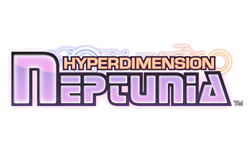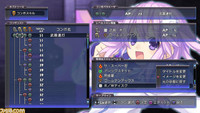|
|

|
PLATFORM
|
PS3
|
BATTLE SYSTEM
|

|
INTERACTION
|

|
ORIGINALITY
|

|
STORY
|

|
MUSIC & SOUND
|

|
VISUALS
|

|
CHALLENGE
|
Adjustable
|
COMPLETION TIME
|
40-60 Hours
|
|
OVERALL

|
+ Terrific, hilarious localization.
+ Surprisingly catchy soundtrack.
- Razor-thin allegory.
- Bland, boring combat.
- Atrociously designed healing system.
- Recycled dungeons.
|
Click here for scoring definitions
|
|
|
Allegory isn't something the gaming world encounters terribly often, and it's an even tougher nail to hit. So when a group of small Japanese developers announced Hyperdimension Neptunia, an RPG whose story was an allegorical representation of the game industry, it turned heads. A little RPG that would have gone largely unnoticed by the western world suddenly grabbed headlines from the mainstream gaming press. For a while, at least; the novelty wore off quickly, and Hyperdimension Neptunia was finally localized and released to western audiences with very little fanfare. Interestingly, this was probably for the best. Hyperdimension Neptunia is a mess of poor game design, and its allegory is so razor-thin that it might as well not have been present at all.
For those not familiar with the premise of Hyperdimension Neptunia, it takes place in the world of Gamindustri (pronounced, unsubtly, "Game Industry"), where four "Console Patron Units", or CPUs, rule over four distinct landmasses. There's Black Heart, ruler of the steam-punk inspired Lastation, White Heart, leader of the fantasy land Lowee, Green Heart, master of the medieval world of Leanbox, and finally Purple Heart, better known as Neptune, the ruler of the highly advanced Planeptune. In case it's not apparent, each of these characters represents one of the current generation consoles, with Neptune representing a fictional SEGA Dreamcast successor. The game begins with Neptune squaring off against the three other CPUs, losing horribly, and being cast down to the human world where she promptly forgets everything about herself. In the human world, she encounters Compa and IF (character representations of game studios Compile Heart and Idea Factory), and the three of them set out to find the source of and then rescue a mysterious voice in Neptune's head. Ultimately, this leads them to do battle against the insidious Arfoire, a being hell-bent on destroying Gamindustri.
Aside from these extremely broad allegorical definitions, Hyperdimension Neptunia really doesn't have anything to do with the game industry or anything currently happening in its political landscape. Instead, it's a typical JRPG story about a group of cute anime girls trying to save the world, though the game certainly certainly enjoys throwing out references to other games and series throughout its duration. Really, the plot only makes the barest of sense, and only survives thanks to the terrific localization provided by NIS America. Hyperdimension Neptunia is easily one of their funniest, most quotable localization efforts to date, and the likeable, silly characters manage to support the go-nowhere story with ease. The vocal work is perfectly suited to the game, and is delivered with enough ham-fisted gusto to provide hours of entertainment, despite the game's many, many problems. Although the actors aren't credited, the voice of Neptune is particularly well-done, and as a main character, she manages to provide the backbone (in fact, almost all) of the game's entertainment value.
Unfortunately, NISA's localization cannot save the rest of the game. From its bland, repetitive combat system to its recycled dungeon designs to its completely insane healing method, there isn't even a hint of quality game design on the disc. In fact, the highest praise that can be given to it is that it's a story-heavy game and there's more story than gameplay present.
 Imagine some jiggling and you'll understand what the portrait animations are like.
Imagine some jiggling and you'll understand what the portrait animations are like.
|
|
The horrors begin with the combat system. On the surface, it appears to be surprisingly complex. Similar to the nested skill chains from the Xenosaga series, Hyperdimension Neptunia allows the player to create custom combos using a wide variety of skills by pressing the X, O, and Triangle buttons in different sequences. When players first open up the combo edit screen, they may be overwhelmed by the number of slots available to customize. Unfortunately, this is really nothing more than a facade—a poorly managed menu that hides an extremely simple and dull combat system. Although it's possible to customize each of these combos and create an enormous number of potential sequences, the reality of the situation is that there will always be one "best" chain for each character that they will use every single turn. Each character is only really proficient in either physical attacks or magical attacks, and among their skills for those types, there are always going to be a set that's better than the others.
There is a small reason to use more than one chain, and that has to do with how combos end. They can end in one of three ways, depending on the skill. One way is a "combo link", which replenishes a small amount of AP (required in varying amounts to perform different actions) and allows the current combo to continue. Another way is "switch", which causes the current character to swap out for the one in the back row, allowing that new character to continue the combo. Finally, "transform" is a technique available only to Neptune and the other CPUs, which causes them to change into a new form, increasing combat parameters.
However, this means that there's only really ever any need to have, at most, three combos per character (easily bound to a series of three of the same buttons and then one other button). Even then, the switch command is rendered all but useless by the fact that, until the end of the game, there are only three characters in the battle party: Neptune, IF, and Compa. While one of these characters could be placed in the back row, it's largely unnecessary and likely unwise as well. Even at the end of the game, acquiring the other CPUs is not only optional, but requires a fair bit of additional grinding, meaning that most players probably won't ever make use of the switch command. The end result? Aside from Neptune, you'll simply be pressing the same four buttons over and over again throughout the game.
The combat is made even worse by the completely mind-boggling healing system, which is quite possibly the single worst bit of game design I've ever encountered. Rather than allowing players to manually heal their characters, healing is performed automatically when characters use item skills that they learn over the course of the game. These item skills trigger based on three conditions. The first is a flat percentage that's determined by allocating item skill points. This can be anywhere from zero to one hundred, and is essentially used to perform a dice roll whenever the other two conditions occurs. The second condition for each skill is a simple, in-game trigger. These can be anything from when a character takes damage, when a character's turn begins, or when a character defends instead of attacking. Finally, each skill also requires a threshold to be reached, in most cases a health percentage. The simplest item skill will cause a character to heal themselves for 30% of their HP when they take damage and their HP is below 50%.
 It looks a lot more complex than it actually is.
It looks a lot more complex than it actually is.
|
|
It might not sound that bad, but when you realize how this all ends up working together, the complete ridiculousness of it becomes readily apparent. More powerful item skills require lower and lower health thresholds to activate, and it's impossible to stack item skills with the same trigger: if a character has two item skills that trigger when she takes damage both at 100%, one that triggers at 50% HP and one that triggers at 30% HP, the weaker, 50% HP one will always activate instead of the stronger one, no matter how low her HP gets. Further, some skills actually manage to cancel each other out; if a character has a skill that causes her to heal for 30% HP whenever she take damage, and another one that causes her to heal for 50% HP when she defends if her HP is at 30% or lower, it is actually entirely impossible to ever activate the second skill, as her HP will never be below 30% without her being dead. As a cherry on top of this delectable sundae, it's impossible to heal outside of battle.
There's a wide array of other minor problems clogging the game. Travel between the four landmasses of Gamindustri can only be accomplished by traversing an admittedly short dungeon, a needless time-sink. Similarly, each character possess a dungeon skill that can be used for simple purposes, but these skills are all tied to completely meaningless timers that serve no purpose. The availability of weapons and armor for purchase is determined by character level, but there doesn't seem to be any sort of logical methodology to which levels, leaving certain characters without an upgrade for lengthy periods of time while others upgrade two or three times in the same period.
Even visually the game isn't particularly impressive. Although the character designs are terrific and the slightly animated, high-definition character portraits are absolutely gorgeous, the 3D models are of rather poor quality and the dungeon designs are even worse, featuring repetitive, bland, and regularly recycled environments. Palette-swapped monsters are commonplace, and in general, the game's visual design reeks of laziness. Strangely, the game's musical score is quite the opposite. Many of the tracks are repeated far more often than they should, but the music is actually very good, catchy even. Coupled with the voicework, Hyperdimension Neptunia's audio is one of the few areas where it does relatively well for itself.
It's honestly rather shocking how distinctly disparate the localization and actual game are in terms of quality. NISA really outdid themselves with Hyperdimension Neptunia, as it is an extremely verbose, story-heavy game, and it's sad that Compile Heart didn't live up to their end of the bargain. In the end, it's difficult to recommend staying away from Hyperdimension Neptunia, because despite its flaws, it may just be the most humorous title NISA's ever released. If you do decide to brave the world of Gamindustri, at least now you'll know what you're getting into.
Review Archives
|









